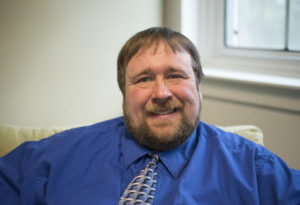Dear UMW Community Members:
This message is to inform you that the Mental Health Crisis Response Working Group has completed its charge (see email below for context and background) and has published the report on the UMW Police Community Advisory Panel (CAP) page under “Final Report to the President.”
President Troy Paino and I are grateful for the working group members’ time and commitment to this important task. If you have any questions about the report, please let me know.
Juliette Landphair, Ph.D.
Vice President for Student Affairs
University of Mary Washington
540-654-1062
jlandpha@umw.edu
Pronouns: She/her/hers
From June 25, 2021:
Dear UMW Community,
On May 13, 2021, President Paino released his response to the report and recommendations of the UMW Police Advisory Committee, which met throughout the 2020-21 academic year.
Dr. Paino’s recommendations included an evaluation of the University’s mental health crisis response. Here is the specific recommendation:
Restructure mental health crisis response. Dr. Juliette Landphair, Vice President for Student Affairs, and Dr. Tev Zukor, Director of the Talley Counseling Center, will form a working group that includes University Police, those on staff responsible for mental health crisis response, and interested students, to develop a timeline and plan for reform that might include:
- 24/7 availability of clinical professionals for student support
- Changes in UMW Police protocols during a mental health crisis
- More Residence Life staff training and communication responsibilities to proactively inform students about student support options
The working group has been established and includes the members below. In addition to gathering feedback from the community, we will be reviewing relevant data, including Campus Police Surveys, and University policies and protocols around crisis response.
We look forward to reporting out the results of our work in the fall. In the meantime, do not hesitate to email me or Dr. Zukor with any questions or insights.
Sincerely,
Juliette Landphair, Ph.D.
Vice President for Student Affairs
Mental Health Crisis Response Working Group
Co-Chairs
- Dr. Juliette Landphair, Vice President for Student Affairs
- Dr. Tev Zukor, Director of Talley Center
Members
- Megan Brown, Area Coordinator for Residence Life and Housing
- Alexandra Diviney, Class of 2022
- Lt. Bill Gill, UMW Police
- Vivian Hyatt, Class of 2022
- Sgt. Tegan Lewis, UMW Police
- Marissa Miller, Director of the Center for Prevention and Education
- Lueden Sheikhnureldin, Class of 2022
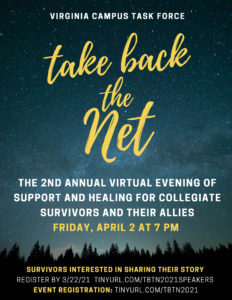 The Virginia Campus Task Force will hold “Take Back the Net,” the 2nd annual virtual evening of support and healing for collegiate survivors and their allies on Friday, April 2 at 7 p.m. Please register at:
The Virginia Campus Task Force will hold “Take Back the Net,” the 2nd annual virtual evening of support and healing for collegiate survivors and their allies on Friday, April 2 at 7 p.m. Please register at: 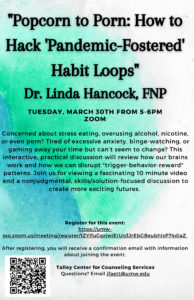 Concerned about stress eating, overusing alcohol, nicotine, or even porn? Tired of excessive anxiety, binge-watching, or gaming away your time but can’t seem to change? This interactive, practical discussion will review how our brains work and how we can disrupt “trigger-behavior-reward” patterns. Join us for viewing a fascinating 10 minute video and a nonjudgmental, skills/solution-focused discussion to create more exciting futures. Dr. Linda Hancock, FNP is a very engaging speaker on mental health topics, and she has spoken before at UMW’s New Student Orientation.
Concerned about stress eating, overusing alcohol, nicotine, or even porn? Tired of excessive anxiety, binge-watching, or gaming away your time but can’t seem to change? This interactive, practical discussion will review how our brains work and how we can disrupt “trigger-behavior-reward” patterns. Join us for viewing a fascinating 10 minute video and a nonjudgmental, skills/solution-focused discussion to create more exciting futures. Dr. Linda Hancock, FNP is a very engaging speaker on mental health topics, and she has spoken before at UMW’s New Student Orientation.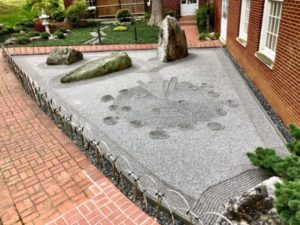
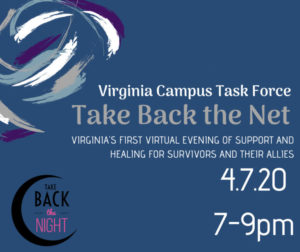 Take Back the Night – an international event that aims to end sexual, relationship and domestic violence in all forms – has had many incarnations since its inception more than 35 years ago, from rallies, marches and performances, to runs, walks and biking events. Now, with the looming presence of COVID-19, the event went virtual for the first time ever. Take Back the Night for 2020 is Take Back the Net.
Take Back the Night – an international event that aims to end sexual, relationship and domestic violence in all forms – has had many incarnations since its inception more than 35 years ago, from rallies, marches and performances, to runs, walks and biking events. Now, with the looming presence of COVID-19, the event went virtual for the first time ever. Take Back the Night for 2020 is Take Back the Net.